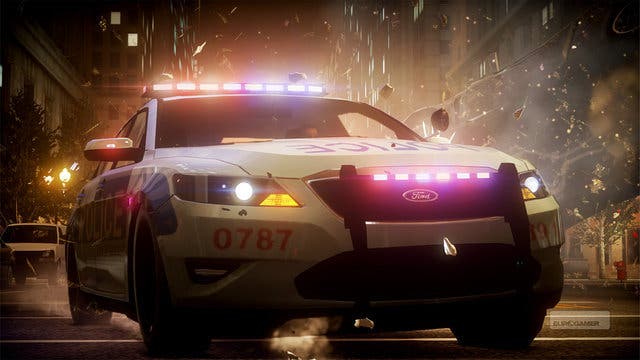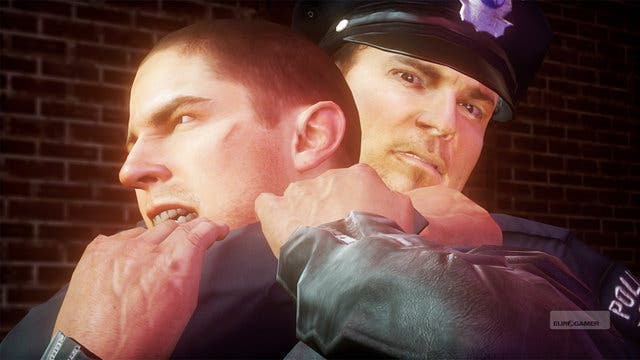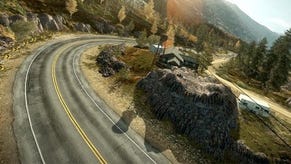Need for Speed The Run
Running scared?
No, apparently not. That would be interactive cut-scenes with big, flashing button prompts for running and punching men and jumping over things and dodging other things, such as machine gun fire emanating from this year's must-have E3 accessory, a slow-motion helicopter.
This is where things start to fall apart for The Run. And it gives me no pleasure to report that they fall apart still further when you play it.
The sequence available to play at the E3 booth has Jack - who has dark hair cropped short, and an angry face - commandeering a police car after a thwarted race and needing to escape the streets of Chicago. Against a countdown timer, you tear through the streets looking for cover from the pursuing helicopter's searchlight; if caught in its glare, the guns will tear you apart.
You need to weave constantly or use elevated train tracks for cover as you pursue the linear course, directed around each bend by walls of neon arrows, as per racing game convention. At scripted moments, control is snatched from you for a few seconds while dramatic cutaway cameras and the ubiquitous slow-motion force your appreciation of the sheer excitement of it all.
It looks good, but it disrupts your rhythm, which is already having a hard enough time coping with the sluggish handling and cumbersome weaving technique. Action racing scenes like this are far from a terrible idea, but they can certainly be more entertaining.
Survive long enough and you're forced into a crash anyway. Cut to inside the car, and you must use a prompted combination of stick gestures and button taps to get an upside-down Jack to free himself from the wreckage before it's hit by an oncoming train. It seems as though this can resolve itself in more than one way - but the gestures are unintuitive, feedback is unreliable and the sense of player involvement in the scene is opaque at best; it's like a lobotomised Heavy Rain.

It doesn't look anything like as impressive as Battlefield 3 either, aside from remarkable shading and texturing on Jack's face that would give it a lifelike quality if his features and facial animation weren't so lifeless. During the chase sequence through the cut-and-paste downtown, The Run simply looks like any other arcade racer.
A few minutes' play is certainly not enough to condemn The Run's handling or overall performance as a racing game. Black Box has form - of both the good and the bad kind, it's true, but we know the studio is capable of punchy tarmac opera.
But as an action game? The presentation is slick, but the beats are hackneyed, the interaction is stilted, the lead has no charisma, and it's hard not to worry that The Run's cinematic ambition will get in the way of its racing fun. Less than 10 per cent of the game will take place out of the car, promises Grimbley, but even that sounds like too much.
More to the point, it might be a misguided idea in the first place.
Arcade racing is suffering a panicked identity crisis. Bizarre has closed while fellow Brit specialists Black Rock and Evolution have had headcounts slashed. They all released racers that flopped. Each game was a high-concept, Hollywood twist on the genre. Each time we were promised that a great, lost audience for racing games was just out of reach, and that this was the game to find it.

It wasn't a question of quality: Blur, Split/Second and MotorStorm: Apocalypse are all fine games. Their failure has been blamed on a "shrinking genre", although it was just this shrinkage that they were trying to reverse with their gimmicks.
Yet within this supposedly flagging niche, we find that games that concern themselves exclusively with sexy cars going really fast - games like Hot Pursuit, as well as sims like Forza and Gran Turismo - enjoy great and continuing success. What does this tell us?
I'm not saying The Run will be the next victim of the great racing cull; if nothing else, it's protected by those magic three words. But perhaps Black Box, and anybody else that's still left making racing games, needs to have a little more faith in our collective need for nothing more than speed.


